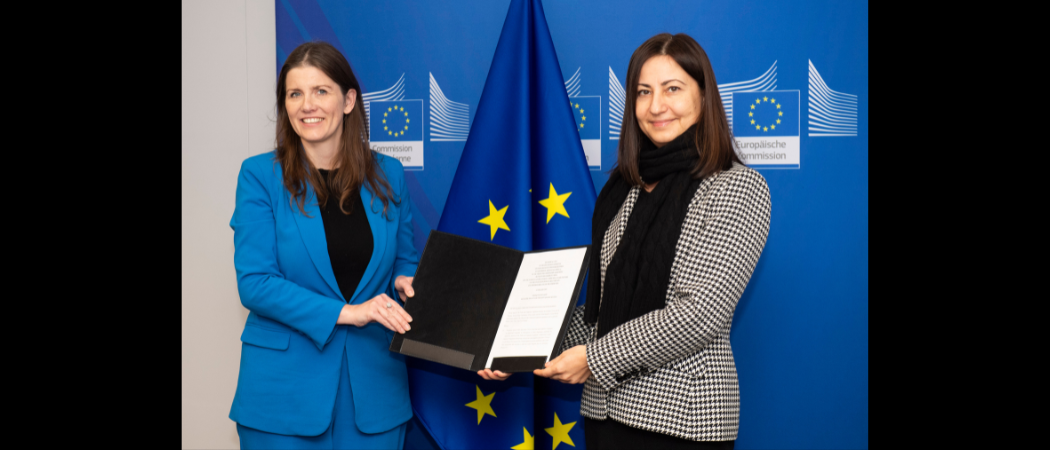With association finally signed off, the UK is making moves to boost its participation in the EU research programme. To get things moving, the government will offer young scientists up to £10K to help with grant applications and is launching a marketing blitz to let researchers across Europe know the UK is back in the game

UK secretary of state for science, innovation and technology Michelle Donelan (Left) with EU research commissioner Iliana Ivanova in Brussels on December 4, 2023. Photo: Lukasz Kobus / European Union
The UK and EU have officially signed off on UK association to Horizon Europe, ending nearly three years of uncertainty in which UK-based researchers were locked out of parts of the scheme due to high-level political disputes.
Yesterday, UK science minister Michelle Donelan was in Brussels on Monday as the deal, agreed in September, was rubber-stamped by the joint committee that oversees UK participation in EU programmes.
The UK will be associated as of 1 January next year, contributing around €2.43 billion per year on average to the EU budget for its participation.
“Obviously, it’s been a long time coming,” said Donelan. “This is not just going to be beneficial for the UK, but also beneficial for Horizon, to be able to have the UK participating and playing a leading role when it comes to research and development.”
Outside Horizon Europe, UK researchers were barred from receiving European Research Council grants and could not coordinate industry collaborations that make up the bulk of the programme.
This led to a halving of UK participation in the scheme, although equivalent UK funding was made available to tide scientists over.
The question now is how quickly UK academics can get back to winning ways and recover the central position they held in Horizon Europe’s predecessor, Horizon 2020.
To encourage a rapid return, Donelan said pump priming grants of up to £10,000 will be available for researchers applying for Horizon Europe funding for the first time, to enable them to submit strong applications.
This will be targeted at “younger researchers, and also those that have not participated before,” she said. The grants will be distributed in partnership with the British Academy and other bodies.
There’s also going to be a publicity blitz. Donelan said the UK would launch a paid marketing campaign to encourage researchers to apply, and make sure the message of UK association is communicated through EU channels too. Donelan discussed this communication push with research commissioner Iliana Ivanova while she was in Brussels.
But there’s no clarity so far on how much money in total will be available for the pump priming grants. “We will flesh out the details of that,” said Donelan.
No data yet on applications
There is no data as yet on whether there had been an increase in applications to Horizon following September’s announcement that the UK would be associating.
“But what we have got is obviously the number of conversations and meetings that we've had with researchers, scientists, and university vice chancellors, who are all extremely excited by this association with Horizon and eager to participate,” Donelan said.
“I know that they've been working hard on bids already, and some of them have already been putting them in for work stream starting from next year,” she said.
Unlike when it was an EU member state, the UK, like other associated countries, won’t have a vote in the committees that decide on the work programmes that detail the exact grants that Horizon Europe distributes.
But Donelan stressed the UK does still get to speak and participate in discussions about the form of the programme, saying, “This does give us a seat at the table, it gives us a voice to be able to help shape the plans.”
With the UK, Canada and New Zealand now with association agreed, this leaves Switzerland, South Korea and Japan as the last remaining countries around the negotiating table with the Commission to join.
“I am happy to welcome the UK back to the Horizon family,” Ivanova said in a statement yesterday. “I have made association of non-EU countries to Horizon Europe my personal priority, and we are delivering.”





 A unique international forum for public research organisations and companies to connect their external engagement with strategic interests around their R&D system.
A unique international forum for public research organisations and companies to connect their external engagement with strategic interests around their R&D system.